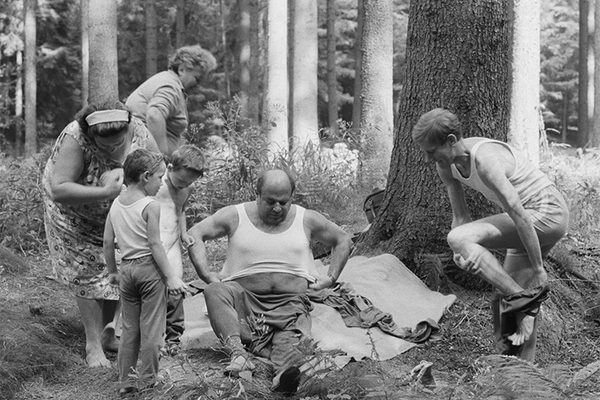Ecce Homo Homolka
de Jaroslav Papousek , Tchécoslovaquie , 1969
Three generations live together in the Homolka family—a couple, their two children, and the grandparents. On a beautiful Sunday in August, after a picnic in the countryside that ends abruptly, they all return to their shared apartment in Prague. But the television is broken. This only serves to exacerbate tensions...
Information about the film's rights and desired prospects
Film representative: Juraj Machálek
Rights holders: Národní filmový archiv, Prague
Rights available: Worldwide, except in France and the Czech Republic
Information on current agreements:
- Type: DVD, VOD, (Theatrical in process)
- Structure: Malavida,
- Duration of authorization (start/end dates): April 1, 2021 - March 31, 2026 (extension in progress)
- Territory: France
Priority needs for the film: International sales, new contacts, distribution
The film has been awarded the Lumière Classics label, which recognizes the most beautiful restorations of the year.

Jaroslav Papousek (1929–1995) was one of the leading figures of the Czechoslovak New Wave, which stood out in the 1960s for its biting tone and brought a breath of fresh air to the country with films that contrasted sharply with the academicism of the communist regime's official productions. As a screenwriter, Jaroslav Papousek collaborated with Milos Forman on Black Peter (1964) and The Firemen's Ball (1967), as well as with Ivan Passer on Intimate Lighting (1965). He moved into directing in 1968 with The Most Beautiful Age, set in the Academy of Fine Arts, from which the filmmaker himself graduated.
The Homolka Family is a satirical comedy that pokes fun at the foibles of an ordinary Prague family trying to enjoy their free time without managing to forget their differences. The film opens in a bucolic setting: a young couple is frolicking in the woods before being disturbed by the arrival of the Homolka clan, who noisily take up their summer quarters. At first, everything seems to promise an idyllic day. The grandparents are resting, the twins Péta and Máta (played by Milos Forman's sons) are playing in the water, while their mother Hedus, who dreamed of being a ballerina, improvises a dance under the trees. Their tranquility is shattered when cries for help echo in the distance, prompting them to flee. The veil of happiness is torn away and the story retreats into a cramped dwelling, where promiscuity lays bare baseness and pettiness. With the touch of a caricaturist, Jaroslav Papousek sketches the weaknesses of his contemporaries, pokes fun at their petty cowardice, and uses farce to depict a society that has lost its way and is going nowhere.
"Under the pretext of chronicling a Sunday in August, marred by comical mishaps, the author describes nothing less than the impotence of the Czech male frustrated in his desires, the marital dissatisfaction caused by the inadequacy of said male, the toxicity of intimate relationships, and the incredible selfishness of a population greedy for material goods. Far from being banned, even though it exudes condemnation of a pathogenic system that drives its citizens to hysteria, the work became a cult classic in 1969 and spawned two sequels. (Baptiste Roux, Positif No. 745, March 2023)
Ecce Homo Homolka
Czechoslovakia, 1969, 1h23, black and white, format 1.37
Director & screenplay Jaroslav Papousek
Cinematography Jozef Ort-Snep
Music Karel Mares
Editing Jirina Lukesová
Set design Karel Cerný
Costumes Ludmila Kaválková
Production Barrandov Film Studio, Sebor
Cast Josef Sebánek (grandfather), Marie Motlová (grandmother), Frantisek Husák (Ludva), Helea Ruzicková (Hedus), Petr Forman (Péta), Matej Forman (Máta), Yvonne Kodonová (Pavlínka), Miroslav Jelínek (Jirka)
Released in Czechoslovakia on March 8, 1970
Released in France in August 1972
4K restoration by the Karlovy Vary International Film Festival in collaboration with the Národní filmový archiv in Prague.
The 4K digitization funded from the donation of Mrs. and Mr. Kučera, was carried out in 2025 in UPP and Soundsquare studios by the Karlovy Vary International Film Festival in collaboration with the Národní filmový archiv, Prague and the Czech Audiovisual Fund. The sources for the digitization were the original image and sound negative preserved by the Národní filmový archiv, Prague.The sources for the digitization were the original image and sound negative preserved by the Národní filmový archiv, Prague.
Re-released in theaters in March 2026 by Malavida.
Thanks to the distributor Malavida and the Národní filmový archiv.
Film that has received the label




